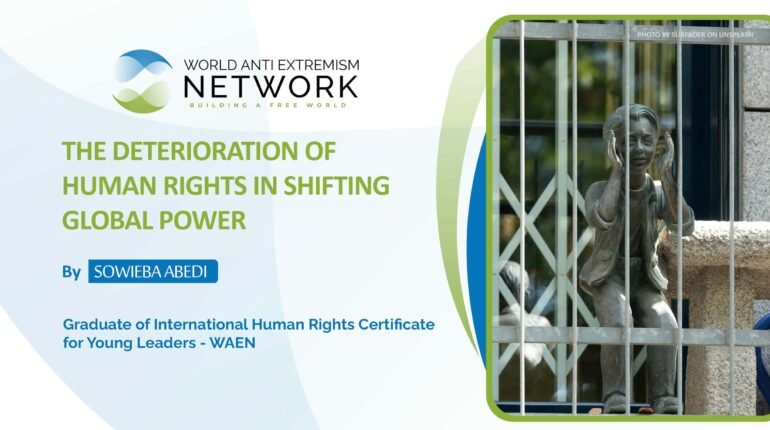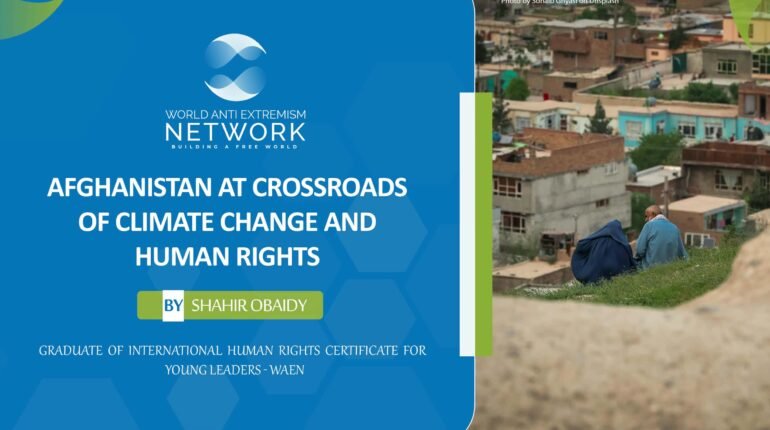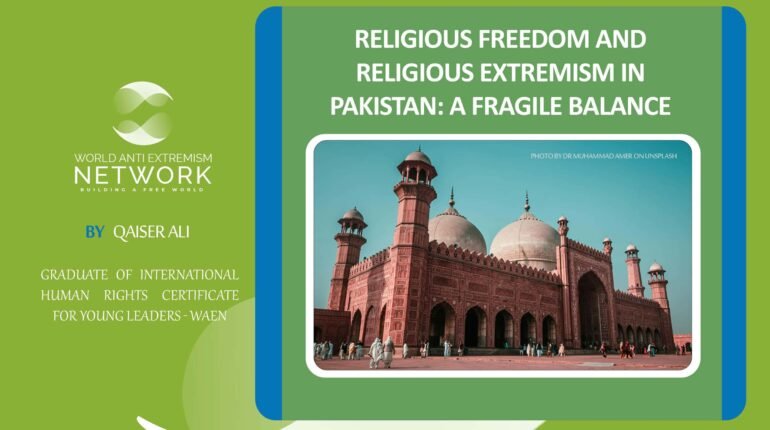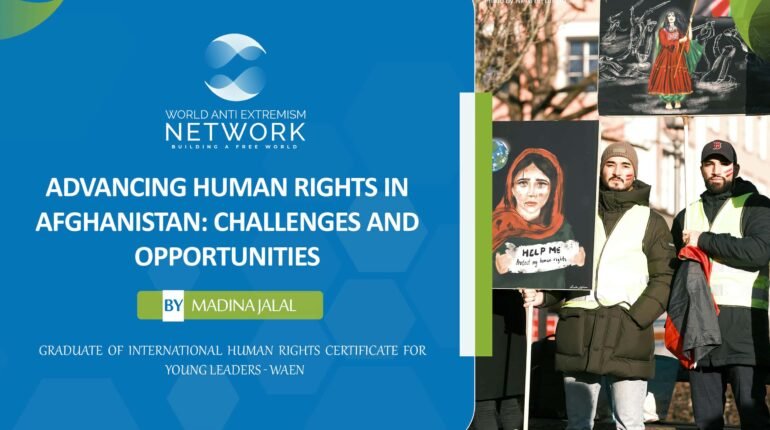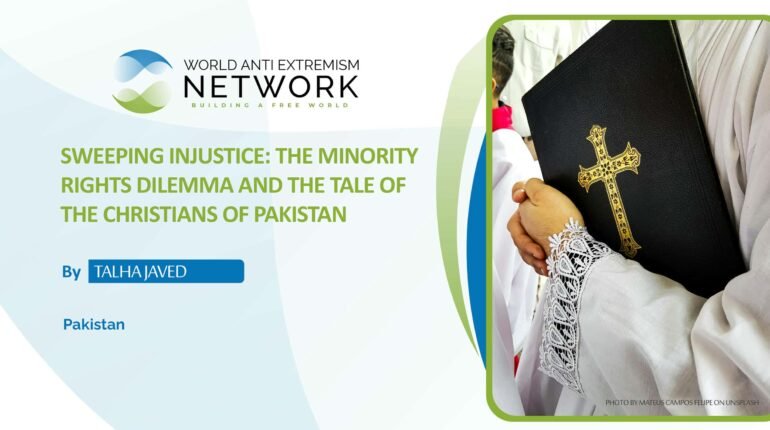Enforced Disappearance as an Organ of Suppression: A Case Study of Grave Human Rights Violation in Pakistan
- World Anti Extremism Network
- Enforced Disappearance as an Organ of Suppression: A Case Study of Grave Human Rights Violation in Pakistan

- Enforced Disappearance as an Organ of Suppression: A Case Study of Grave Human Rights Violation in Pakistan
- By Saif Ali
- April 11, 2025
Share on:
“The dead have a grave. But the disappeared persons have no signs — alive or dead. And we can neither mourn their absence nor celebrate our happiness,” says the wife of Gul Muhammad Marri, a resident of Kohlu (Balochistan, Pakistan) who has been missing for the last 12 years.
Introduction:
Enforced Disappearance has been instrumentalized as a tool for curbing dissent voices by authoritarian regimes. This practice spreads fear which affects not only the targeted individual but their loved ones and communities. This action is against international law as it breaches fundamental freedoms proclaimed in the Universal Declaration of Human Rights. Pakistan is among such countries where the issue of enforced disappearance is yet not resolved. The human rights advocates have shown serious reservations over this issue and called for strict adherence to constitutional as well as international human rights laws.
Defining “Enforced Disappearance”:
Article 1 of the International Convention for the Protection of All Persons from Enforced Disappearance (ICPAPED) defines, “enforced disappearance” as the “arrest, detention, abduction or any other form of deprivation of liberty by agents of the State or by persons or groups of persons acting with the authorization, support or acquiescence of the State, followed by a refusal to acknowledge the deprivation of liberty or by concealment of the fate or whereabouts of the disappeared person, which place such a person outside the protection of the law.”
In terms of legal bindings of human rights violations, the act of enforced disappearance violates the right to freedom, right to personal safety, freedom of speech, right to protection against torture, right to personal dignity, right to protection against arbitrary detention or arrest, right to free and fair trial and even right to life in some cases.
“Missing persons” in Pakistan:
In Pakistan, individual freedom was majorly undermined amid political instabilities from its inception. The Praetorian state of affairs deplored civil liberty which continues till today. These disappeared people are often termed “missing persons” in Pakistan as “They go missing when state officials (or someone acting with state consent) grab them from the street or their homes and then deny it, or refuse to say where they are. Sometimes disappearances may be committed by armed non-state actors, like armed opposition groups” following the definition by Amnesty International.
The surge in the number of missing persons was observed in 2001 as a strategy during the ‘War on Terror’ but this issue has persisted since the 1980s. The rights activists, journalists, students, political opponents, and dissenters are the common targets of enforced disappearance. Baloch, Pashtun, and Shia missing persons are major ethnic groups that often suffer such damage. These groups have shown frequent resistance to the criminal offense of enforced disappearance most prominently the Baloch Families’ March towards Islamabad in December 2023, which was dealt harshly; welcomed by tear gases, showered with ice-cold water, beaten and arrested by Islamabad Police. This incident was followed by some other events which vanished the hope of the families of missing persons which they held and marched towards the capital city.
Articles 9 and 10 of the constitution of Pakistan provide legal protection (not fully) from arbitrary arrest and detention-exempting preventive detention and ensure individual liberty. Article 199 entitles the right to challenge the legality of detention and 184(3) grants the authority to the Supreme Court for taking up any kind of matter regarding the enforcement of human rights and matters of public importance as a whole.
Commission of Inquiry on Enforced Disappearances:
Commission of Inquiry on Enforced Disappearances (CoIoED) was established back in 2011 for six months. It was given the superior mandate to “trace the whereabouts of allegedly enforced disappeared persons”, “fix responsibility on individuals or organizations responsible”, and “register or direct the registration of FIRs against named individuals, who were involved either directly or indirectly in the disappearance of an untraced person”. The Commission announced that it had resolved 7,164 cases out of the 9,393 registered cases by March 2023. While the commission failed to hold the perpetrators accountable, the judicial proceedings allege the government responsible for enforced disappearances. International Commission of Jurists (ICJ) also deemed the failure of the commission highlighting serious flaws as well as indicating that the commission was just an effort to deflect criticism while it conducted a “compromised inquiry process where investigations do not lead to accountability”.
A report published by the International Commission of Jurists (ICJ) comments that this practice is no longer limited to the war zone areas but rather anywhere where it’s needed to silence dissent. The report also notes that despite enough efforts by families of victims, the perpetrators have been never identified or held accountable. The immunity enjoyed hitherto by Law Enforcement Agencies (LEAs) is problematic.
Guidance for Submitting a Petition to the Committee on Enforced Disappearances:
Constitutional Authority:
Provincial high courts have, under Article 199(1)(c) of the constitution of Pakistan, the power to issue directions to provincial government and authorities about the enforcement of fundamental human rights upon receiving any complaint from any person; under Article 199(2) this right may not be curbed. Supreme Court has also the authority to take notice of such matters.
How to submit individual complaints?
Petitions and Urgent Actions Section (PUAS) of the Office of the United Nations High Commissioner for Human Rights (OHCHR) has a mechanism to register enforced disappearance. The petitioner can send an Office at ohchr-petitions@un.org. This procedure considers the State party concerned, the Complainant and victim, the Representative, Anonymization of a complainant’s and/or victim’s name, Use of other international mechanisms, Interim and protection measures, Facts, including exhaustion of domestic remedies and Claim as the major steps of submitting the petition.
Pakistan is not the signatory to the International Convention for the Protection of All Persons from Enforced Disappearance (ICPAPED) and Article 32 of ICPAED declares that “The Committee shall not receive communications concerning a State Party which has not made such a declaration”. Thus, Pakistan is not obliged to respond to international pressure. Therefore, concerning the grave human rights violations regarding the under-discussed issue, international bodies, and domestic civil society must call for the state to sign the ICPAED for international monitoring.
While Pakistan has not signed the International Convention for the ICPAED, it has signed or ratified some other related human rights conventions that bind it to prevent such human rights violations. These include several other significant human rights conventions including the International Covenant on Economic, Social and Cultural Rights (ICESCR), the International Covenant on Civil and Political Rights (ICCPR), the Convention against Torture and Other Cruel, Inhuman or Degrading Treatment or Punishment (CAT).
Recommendations:
- Article 1 (2) of the International Convention for the Protection of All Persons from Enforced Disappearance dictates that “no exceptional conditions”: such as threat of war or even state of war, intense political chaos, or any other kind of public extraordinary situation may be valid to justify the act of enforced disappearance. Therefore, people must not accept any narrative from the state trying to justify any case of enforced disappearance.
- The judiciary must play a proactive role in executing the authority delegated by the Constitution.
- Commission of Inquiry on Enforced Disappearances must be dissolved and give no further extensions as it has failed to yield its raison d’etre.
- The state must be pressurized to ratify the International Convention for the Protection of All Persons from Enforced Disappearance and ensure deep compliance with it.
- The Ministry of Human Rights and Human Rights Commission of Pakistan should be empowered to raise issues and be a party while filing cases of missing persons.
- International human rights organizations must be facilitated to have offices and officials in the country to communicate with the state and victims readily.
- Human rights organizations and civil society must invest in the capacity building of human rights defenders who are vocal about the cause of enforced disappearance as well as make people aware of the gravity of this issue.
- There must be an independent network to register reports of enforced disappearance, offer legal aid for the victims, and raise the issue with international stakeholders
- Individual protest brings no result therefore; the victims must unite and organize themselves to spring up against this heinous human rights violation.
- There must be counter-narratives to spread awareness among the masses regarding the severity of this issue and consider it an “extraordinary “violation of human rights rather than a “normal” action.
- There must be state-sponsored initiatives to rehabilitate the victims and cure Post-traumatic stress disorder (PTSD) caused by the incident,
Conclusion:
The final thought lies in the words of “Disappeared!—Technique of terror”, a report for the Independent Commission on International Humanitarian Issues, that “it is in awareness, of the individual, of the community, of society as a whole, that the greatest hope lies”. Even during dark days, we need to hold each other raise our voices against systemic injustice, and contribute to the validity of human rights as a sacred necessity. The cases of enforced disappearance stigmatize the country as a place characterized by inhumane practices. Therefore, along with the struggles of activists, victims, and human rights defenders, the state must acknowledge the seriousness of this issue, show the political will to eradicate the problem, and adopt the urgency of legal implementations.

About the Author
Saif Ali holds an undergraduate degree in International Relations and has extensive experience in research, educational development, and advocacy. His primary interests lie in human rights and human security in the Gilgit Baltistan region, complemented by a strong commitment to activism in Pakistan.
The opinions expressed in these articles are solely those of the authors and do not reflect the views or positions of the organization. If you find any information incorrect, please contact (research@worldantiextremism.org), and we would be happy to assist you. You can download, distribute, and reuse this work, provided you credit the author and cite the original source.
Related Articles
Subscribe to our newsletter and stay updated.
Contact
Toronto, Ontario, M1L 0E5 Canada
Subscribe to our newsletter and stay updated.
Contact
Toronto, Ontario, M1L 0E5 Canada
Subscribe to our newsletter and stay updated.
Contact
Toronto, Ontario, M1L 0E5 Canada


